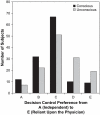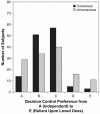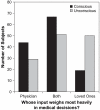When patients lack capacity: the roles that patients with terminal diagnoses would choose for their physicians and loved ones in making medical decisions
- PMID: 16256898
- PMCID: PMC2604910
- DOI: 10.1016/j.jpainsymman.2005.04.010
When patients lack capacity: the roles that patients with terminal diagnoses would choose for their physicians and loved ones in making medical decisions
Abstract
Current approaches to end-of-life decision making are widely considered inadequate. We explored these complexities by examining how patients with terminal diagnoses would choose to involve their physicians and loved ones in making medical decisions, assuming they were able and unable to participate. Cross-sectional interviews of 130 patients recently diagnosed with fatal conditions were conducted. Patients were recruited from two academic medical centers using a modification of the Decision Control Preferences Scale, ranging from independent decision making to decision making that relies upon others. Patients were asked how they would balance their own wishes relative to the input of physician and loved ones in making medical decisions, and to weigh the input of loved ones relative to physician. Most patients (52%), assuming they had the capacity, would opt to share decision making with their physicians, but 15% would defer to their physicians and 34% would make decisions independently. Similarly, 44% would share decision making with their loved ones, but fewer (6%) would defer to their loved ones. Thirty-nine percent would rely upon their physicians' judgments about what would be best for them rather than their own wishes if they became unconscious, compared with 15% who would do so if they were conscious (P < 0.001). Nonetheless, patients were more likely to weigh their loved ones' input more heavily than their physicians' input if they were unconscious (33%) than if they were conscious (7%, P = 0.05). Race, religion, gender, diagnosis, and health status were largely unassociated with patients' decision control preferences. Patients with terminal diagnoses report a wide diversity of decision control preferences, but most would opt to share decision making with their physicians and loved ones. If unable to decide for themselves, they shift toward greater reliance on physician input relative to their own wishes but would weigh loved ones' input more heavily than physician input. Deciding for patients who cannot speak for themselves may be more complex than has previously been reflected in law, policy, or clinical ethics.
Figures
Similar articles
-
How would terminally ill patients have others make decisions for them in the event of decisional incapacity? A longitudinal study.J Am Geriatr Soc. 2007 Dec;55(12):1981-8. doi: 10.1111/j.1532-5415.2007.01473.x. Epub 2007 Nov 20. J Am Geriatr Soc. 2007. PMID: 18031490 Free PMC article.
-
The Trial of Ascertaining Individual Preferences for Loved Ones' Role in End-of-Life Decisions (TAILORED) Study: A Randomized Controlled Trial to Improve Surrogate Decision Making.J Pain Symptom Manage. 2017 Oct;54(4):455-465. doi: 10.1016/j.jpainsymman.2017.07.004. Epub 2017 Jul 14. J Pain Symptom Manage. 2017. PMID: 28712987 Free PMC article. Clinical Trial.
-
Knowing loved ones' end-of-life health care wishes: attachment security predicts caregivers' accuracy.Health Psychol. 2011 Nov;30(6):814-8. doi: 10.1037/a0025664. Health Psychol. 2011. PMID: 22081941 Free PMC article.
-
Beyond autonomy: diversifying end-of-life decision-making approaches to serve patients and families.J Am Geriatr Soc. 2005 Jun;53(6):1046-50. doi: 10.1111/j.1532-5415.2005.53317.x. J Am Geriatr Soc. 2005. PMID: 15935032 Review.
-
A model for emergency department end-of-life communications after acute devastating events--part I: decision-making capacity, surrogates, and advance directives.Acad Emerg Med. 2012 Sep;19(9):E1068-72. doi: 10.1111/j.1553-2712.2012.01426.x. Acad Emerg Med. 2012. PMID: 22978734 Review.
Cited by
-
Engaging in patient decision-making in multidisciplinary care for amyotrophic lateral sclerosis: the views of health professionals.Patient Prefer Adherence. 2012;6:691-701. doi: 10.2147/PPA.S36759. Epub 2012 Sep 27. Patient Prefer Adherence. 2012. PMID: 23055703 Free PMC article.
-
Symptom frequency, severity, and quality of life among persons with three disease trajectories: cancer, ALS, and CHF.Appl Nurs Res. 2015 Nov;28(4):311-5. doi: 10.1016/j.apnr.2015.03.005. Epub 2015 Mar 13. Appl Nurs Res. 2015. PMID: 26608431 Free PMC article.
-
"Doctor, Make My Decisions": Decision Control Preferences, Advance Care Planning, and Satisfaction With Communication Among Diverse Older Adults.J Pain Symptom Manage. 2016 Jan;51(1):33-40. doi: 10.1016/j.jpainsymman.2015.07.018. Epub 2015 Sep 3. J Pain Symptom Manage. 2016. PMID: 26342727 Free PMC article.
-
Decision-making capacity and communication about care of older people during their last three months of life.BMC Palliat Care. 2013 Jan 10;12:1. doi: 10.1186/1472-684X-12-1. BMC Palliat Care. 2013. PMID: 23305093 Free PMC article.
-
Development and pilot of a decision-aid for patients with bipolar II disorder and their families making decisions about treatment options to prevent relapse.PLoS One. 2018 Jul 10;13(7):e0200490. doi: 10.1371/journal.pone.0200490. eCollection 2018. PLoS One. 2018. PMID: 29990368 Free PMC article.
References
-
- Buchanan AE, Brock DW. Deciding for others. Cambridge University Press; Cambridge, MA: 1989.
-
- Beauchamp TL, Childress JF. Principles of bio-medical ethics. 5th ed. Oxford University Press; New York: 2001. pp. 98–103.
-
- U.S. Congress . Omnibus Budget Reconciliation Act of 1990. Pub L No. 101-508.
-
- Ott BB. Advance directives: the emerging body of research. Am J Crit Care. 1999;8:514–519. - PubMed
-
- Ditto PH, Danks JH, Smucker WD, et al. Advance directives as acts of communication: a randomized controlled trial. Arch Intern Med. 2001;161:421–430. - PubMed
Publication types
MeSH terms
Grants and funding
LinkOut - more resources
Full Text Sources
Medical




